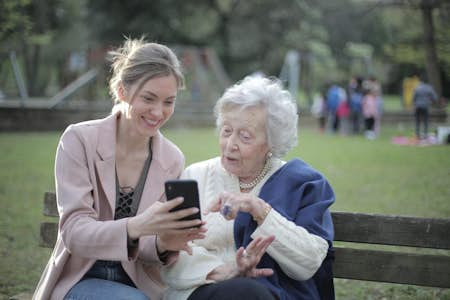The prospect of spending Christmas alone is a stark reality for many. Even if last Christmas was filled with friends and family get-togethers, this year might be very different. Taking a proactive approach at this time of year can help us end loneliness for ourselves and others.
There’s no need to recreate the traditional images of family and friends gathered around the Christmas tree to enjoy Christmas time. Instead, starting new traditions, making an effort to help others, and trying new things could make this year the best Christmas you've had — even if you spend it alone.
Will I feel lonely if I spend Christmas alone?
Loneliness isn't the same as not seeing people. Experts believe that loneliness is linked to the strength of our relationships, not the number of them. As such, loneliness is different from social isolation. This is why we can be surrounded by people but still feel lonely or only have one or two friends and feel perfectly happy.
Being alone this Christmas doesn't mean you have to feel lonely. Being involved in activities you enjoy or connecting with loved ones on video calls can be just as helpful as face-to-face interactions. We've created this guide to help you avoid loneliness and enjoy this year's festivities.
1. Examine your outlook on loneliness
Between 2016 and 2017, the Office for National Statistics researched loneliness across the UK. They found that loneliness isn't restricted to older people or any gender. In fact, perhaps surprisingly, young people reported the highest feelings of loneliness.
The reality is that it's completely normal to feel lonely sometimes. The emotions that often accompany loneliness — anxiety, helplessness, and shame — can make us unsure of ourselves and wary of social situations. It can also make us view our interactions negatively.
However, we needn't feel embarrassed about feeling lonely. It's part of the human experience, and we can use it to make positive changes. Spending Christmas alone, like many millions of other people in Britain expect to this year, doesn't have to equate to feeling lonely.
Sometimes, we might feel lonely because we expect to. In 2014, researchers studied whether participants' expectations of loneliness correlated with their feelings of loneliness eight years later. Many participants who expected to feel lonely did feel lonely. Researchers concluded that age-based stereotypes might contribute to feelings of loneliness.
So, you don't have to feel lonely this Christmas just because you expect to. You might be perfectly happy with your own company or find ways to combat loneliness that give you and others a Merry Christmas! Either way, understanding how you feel now is a significant step toward finding a way to feel better.
2. Video chat with friends and family
When the people you care about are far away at Christmas, video calling is an excellent way to connect with them. A study undertaken between 2012 and 2014 looked at the effects of video calling over a two-year period. Results showed that video call users were half as likely to show depressive symptoms compared to those who only used a phone call to keep in touch with loved ones.
The category of people who didn't use video chat included instant messaging and social media users. This suggests that video calls have a unique effect on us. It might not be as good as spending the day with someone else, but it can still create a sense of togetherness that other forms of contact don't.
3. Make this Christmas about others
Christmas traditions are lovely, but they can weigh heavy with expectations. If you're not ordinarily alone at Christmas time, you might miss the usual festivities. Rather than feeling down and missing traditions, you could create a different kind of Christmas.
One option is to make this Christmas about creating new traditions that don't rely on your usual family activities. You might associate Christmas with full-house decorations and a giant feast, but you can celebrate in many different ways. So why not do something different? Get out and hand-deliver Christmas cards to lonely people in your community, or join a group to sing carols on people's doorsteps.
Making Christmas about other people is a great way to redirect your attention away from your feelings of loneliness and make new connections that will stop you from feeling lonely.
Charities like the Samaritans and Silver Line need volunteers for their helplines over Christmas. Many other charities also set up online fundraisers and appeals for supplies, so you can help others in many ways by volunteering this Christmas.
Buying gifts from small businesses and independent craft makers is another way to positively contribute to a local seller's income and come away with a beautiful gift to brighten someone's Christmas Eve or Christmas Day.
We spoke about this to Jess Baker, chartered psychologist and co-author of The Super-Helper Syndrome: A Survival Guide for Compassionate People. Jess told Health Times: "There is lots of scientific research of the benefits of volunteering - not just for the person being helped, but also to the volunteer themselves. In one study, Allan Luks surveyed thousands of volunteers across the US. The volunteers reported experiencing a natural high when they helped. This sense of euphoria can be explained by the release of endorphins, an effect known as the ‘helper’s high’.
"From my own research with people who love to help others, some said that helping helped to boost their own self-worth and gave them meaning to their lives, ‘Helping makes me happy, gives me a sense of value and means that I actually like myself.’ Helping others has been found to reduce your own stress levels, make you feel calmer, and has even been reported to improve physical health conditions such as arthritis and asthma."
4. Say yes to new things
It's easy to stay in our comfort zones, especially during winter, when it's cold and dark outside. But if you think you will be spending more time on your own, it could be an excellent opportunity to try new things.
At Christmas time, there are many local community events you can get involved in. Join a craft group to learn how to hand-make Christmas wreaths, cook a Christmas pudding or craft some Christmas decorations. You’ll gain a new skill and get to know the people in your community better.
Taking up new hobbies provides a chance to meet new people. Consider your interests and how you want to expand your skills or knowledge. The people you meet along the way may become new friends with shared interests.
5. Talk to someone about how you feel
Feeling lonely can make you feel a little helpless. If you can't see a quick way to change your situation, you might wonder how talking to someone will help. Often, getting another perspective can help you see your situation differently and find new solutions.
Age UK has published a comprehensive guide on what to do if you feel lonely, including how to get help and make new connections. They say:
"Ignoring [a worry about your mental wellbeing] doesn't make it go away, it's likely to only make it worse in the long term. Maybe now is the time to take that first step to helping yourself feel better."
You don't have to suffer in silence if you feel down or lonely. Your GP can signpost you to a range of brilliant resources. Speaking with a psychotherapist about your feelings can help, but even talking to a friend or family member is a step in the right direction.
6. Get active to reduce loneliness
Many studies have shown physical activity reduces feelings of anxiety, depression and loneliness. For example, joining a community walking group or attending an exercise class are great ways to alleviate loneliness.
A study by the charity better.org.uk found that nine out of 10 people across the UK found exercise helped reduce feelings of loneliness. 54% found walking or running in the open air was the best remedy.
Something as simple as walking in your neighbourhood creates opportunities for new connections and friendships. For example, you might have spotted a neighbour going on regular walks. Why not suggest going together or striking up a conversation about the best places to go? Connecting even briefly with the people around us helps us gain a positive perspective on our lives.






